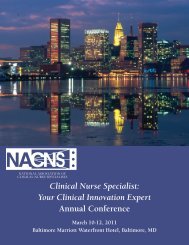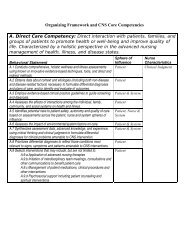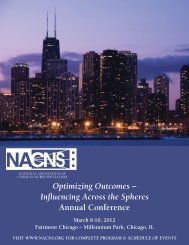Physician
Medicare Physician Guide - National Association of Clinical Nurse ...
Medicare Physician Guide - National Association of Clinical Nurse ...
- No tags were found...
You also want an ePaper? Increase the reach of your titles
YUMPU automatically turns print PDFs into web optimized ePapers that Google loves.
HEALTH CARE FRAUD AND PROGRAM ABUSE<br />
CMS emphasizes early detection and prevention of health care fraud and program<br />
abuse. An estimated 10 percent of Medicare costs are wrongly spent on incidences of<br />
fraud and abuse. Preventing and detecting fraud and abuse is a cooperative effort that<br />
involves:<br />
CMS;<br />
Beneficiaries;<br />
Medicare Contractors;<br />
Providers, suppliers, and other health care entities;<br />
State Medicaid Fraud Control Units;<br />
Quality Improvement Organizations;<br />
Department of HHS Office of Inspector General (OIG);<br />
Department of Justice (DOJ), including the Federal Bureau of Investigation; and<br />
Other Federal law enforcement agencies.<br />
The efforts of these groups can help deter health care fraud and program abuse and<br />
protect beneficiaries from harm by:<br />
Identifying suspicious Medicare charges and activities;<br />
Investigating and punishing those who commit Medicare fraud and abuse; and<br />
Ensuring that money lost to fraud and abuse is returned to the Medicare Trust<br />
Fund.<br />
Federal health care fraud generally involves an individual’s or entity’s intentional use of<br />
false statements or fraudulent schemes (such as kickbacks) to obtain payment for, or to<br />
cause another individual or entity to obtain payment for, items or services payable under<br />
a Federal health care program. Some examples of fraud are:<br />
Billing for services not furnished;<br />
Soliciting, offering, or receiving a kickback, bribe, or rebate;<br />
Violations of the physician self-referral (“Stark”) prohibition;;<br />
Using an incorrect or inappropriate provider identifier in order to be paid (e.g.,<br />
using a deceased individual’s provider identifier);;<br />
Signing blank records or certification forms that are used by another entity to<br />
obtain Medicare payment;<br />
Selling, sharing, or purchasing Medicare Health Insurance Claim (HIC) numbers<br />
in order to bill false claims to the Medicare Program;<br />
Offering incentives to Medicare beneficiaries that are not offered to other patients<br />
(e.g., routinely waiving or discounting Medicare deductibles, coinsurance, or<br />
copayments);<br />
Falsifying information on applications, medical records, billing statements, cost<br />
reports, or on any statement filed with the government or its agents;<br />
Using inappropriate procedure or diagnosis codes to misrepresent the medical<br />
necessity or coverage status of the services furnished;<br />
Medicare <strong>Physician</strong> Guide: A Resource for Residents, Practicing <strong>Physician</strong>s and Other Health Care Professionals 61





